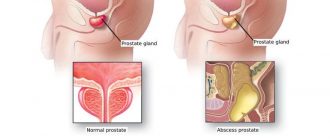An enlarged prostate is medically called benign prostatic hyperplasia (formerly called adenoma). The exact origin of the disease has not yet been studied, but predisposing factors have been identified. Eliminating the symptom requires careful diagnosis and medication, and in some cases, surgery. Without treatment, an enlarged prostate gland can lead to the development of cancer and threaten the patient's life.
Causes
There are 2 main reasons why the prostate gland grows - as a result of pathology or age-related changes.
Prostate enlargement occurs gradually with age as a result of metabolic disorders and increased testosterone production. Noticeable growth is observed after 40-50 years.
In some cases, an increase in prostate volume may not cause complications or unpleasant symptoms. But there is a risk of malignancy and metastases. But, in addition to cancer, the appearance of which may not occur, increased size also has another effect. A large prostate in men puts pressure on the bladder and urethra. This causes many unpleasant symptoms and urinary problems, which can subsequently lead to urolithiasis and kidney failure.
Prostate enlargement in young men occurs less frequently and indicates the development of pathologies, most often prostatitis.
The exact causes of prostate enlargement are not fully understood, however, there are various factors that can contribute to this. These include:
- stagnation of prostate secretions (can occur due to various reasons - rare or too frequent sexual intercourse, interruptions in the process, the presence of cystic formations in the gland);
- poor blood circulation in the pelvis (reasons: sedentary lifestyle, disorders of the cardiovascular system, fatty foods, alcohol consumption, smoking, injuries);
- hormonal disorders;
- infections and inflammatory processes of the genitourinary system;
- hereditary predisposition.
Their influence is revealed as a result of diagnosis, because in order to prevent complications or relapses of the disease, it is necessary to eliminate the cause of the disease.
Symptoms
Symptoms of an enlarged prostate depend on the degree of development of the disease. There are 3 stages:
- Compensated.
- Subcompensated.
- Decompensated.
The compensated stage implies an increase in the prostate gland by 2 times, its period lasts 1-3 years. At this time, problems with urination begin to appear - the urge occurs frequently, especially at night, the stream is weak.
The subcompensated stage is characterized by the development of problems with urination. The bladder is no longer able to function normally; after emptying, residual urine remains, incomplete emptying is felt, fluid comes out in small portions, and blood impurities or turbidity may be observed. You often feel weak, constipated, and the temperature can sometimes rise to 38 °C. Libido decreases and erection worsens; pain may be felt after ejaculation.
In the decompensated stage, the walls of the bladder are already greatly stretched, urine is released drop by drop, most often with blood and is cloudy. Symptoms of kidney failure are observed. After urination, there is a feeling of pain.
Diagnostics
When visiting a doctor with urinary problems, the first step will be to collect information about other characteristic symptoms. The enlarged size of the prostate gland in men is detected quite simply - by palpation at the first visit to the urologist. Next, it is necessary to conduct a series of laboratory and instrumental tests to determine the specific disease and its cause. The following procedures are prescribed:
- Donation of urine and blood for general analysis.
- Blood donation for biochemistry and PSA.
- Collection and examination of prostate secretions.
- Ultrasound examination.
- Study of urination (uroflowmetry).
- Biopsy (if PSA is elevated).
Treatment
Treatment for an enlarged prostate is prescribed depending on the identified disease. Most often, an integrated approach is used, which includes taking medications, physiological procedures and traditional medicine.
Medication
If you have an enlarged prostate, you should take:
- antibiotics (if the enlargement of the gland is due to prostatitis of bacterial origin);
- alpha-1 blockers (make urination easier by relaxing the smooth muscles of the prostate and bladder neck);
- alpha-5-reductase inhibitors (inhibit the production of testosterone, which leads to slower growth of the prostate gland);
- analgesics;
- immunomodulators;
- muscle relaxants.
Physiological procedures are prescribed depending on the individual characteristics of the course of the disease, because some of them can be harmful if the pathology is of bacterial origin or may be ineffective.
Folk
Treatment with folk remedies for prostate enlargement is carried out using the following components:
- walnut;
- pumpkin seeds;
- pumpkin oil;
- onion peel;
- aspen bark;
- chestnut
Prevention
Preventive measures are also prescribed, including the recommended diet and drinking regimen, cessation of alcoholic beverages and smoking. Dietary nutrition involves stopping the consumption of fatty, spicy, salty and smoked foods, increasing the proportion of plant foods in the diet, and abandoning a number of foods that increase gas formation in the intestines. It is also recommended to drink at least 3 liters of still water per day, this will help normalize urination. But before a night's rest you should refrain from drinking.
Operation
If the prostate is enlarged by 3-4 times, surgical intervention is prescribed, which involves complete or partial removal of the overgrown tissue. Depending on individual indicators, the optimal way to carry it out is selected. Depending on the size of the prostate gland and the pressure on the urethra, surgery may be planned or urgent. In the first case, additional examinations and a course of antibiotics are prescribed. In the second case (if the urethra is almost completely blocked and the patient is at risk of kidney failure), it is carried out as soon as possible, but, due to the lack of a preparatory period, it can be associated with a large number of complications and consequences.
Possible consequences
Without treatment, prostate enlargement threatens the patient with the following consequences:
- increased pain when urinating, frequent constipation, decreased potency;
- overgrown tissue can become malignant, that is, become a malignant formation (cancer) and begin metastasis;
- With difficulty urinating, kidney failure will begin to appear. Its progression can lead to death.



